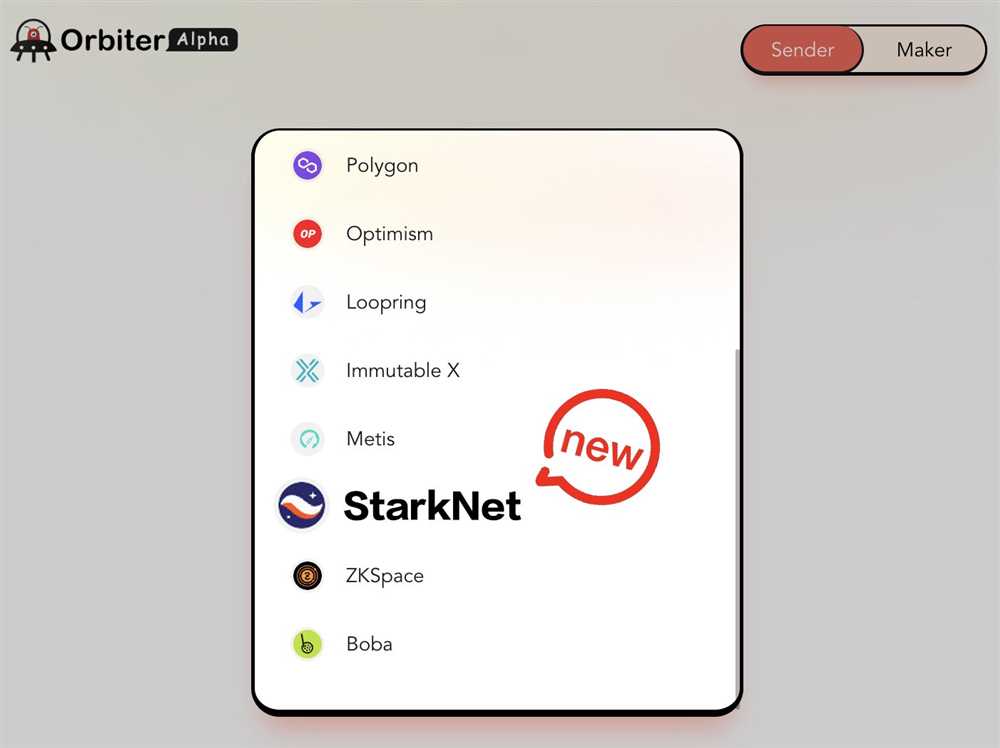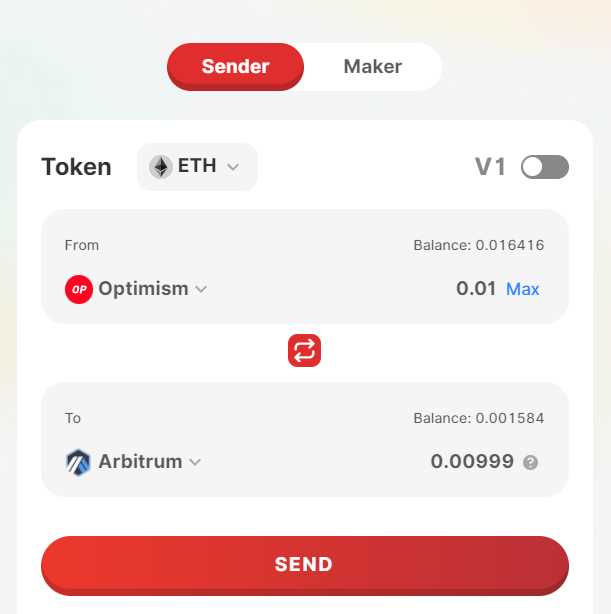
Exploring the Benefits of Interoperability in DeFi: The Case of Orbiter Finance

Decentralized Finance (DeFi) has revolutionized the financial industry by introducing trustless and permissionless transactions on the blockchain. However, the growth and adoption of DeFi have been hindered by the lack of interoperability between different protocols and platforms. This limitation has prevented users from fully harnessing the potential of DeFi and has limited the overall scalability of the ecosystem.
Orbiter Finance, a pioneering DeFi platform, aims to address this challenge by focusing on interoperability. By enabling seamless communication and interaction between various DeFi protocols and blockchains, Orbiter Finance unlocks a world of possibilities and brings DeFi to new heights.
One of the key advantages of Orbiter Finance’s approach to interoperability is the ability to maximize liquidity. With interoperability, users can access a wider range of assets and liquidity pools, allowing for deeper liquidity and more efficient trading. This unlocks the potential for larger trades with minimal slippage, enhancing the overall trading experience for users.
In addition, Orbiter Finance’s interoperability model promotes innovation and collaboration within the DeFi space. By connecting different protocols and platforms, developers can leverage the strengths of each system and build on existing infrastructure. This fosters a vibrant ecosystem of interoperable applications and protocols, encouraging creativity and pushing DeFi’s boundaries even further.
Furthermore, interoperability opens up new avenues for decentralized lending and borrowing. With access to a broader range of collateral assets and lending protocols, users can enjoy more favorable loan terms and lower interest rates. This not only benefits individuals seeking loans, but also empowers businesses to access affordable capital and grow their operations.
Overall, Orbiter Finance’s focus on interoperability is unlocking the full potential of DeFi by breaking down barriers and connecting different protocols and platforms. The advantages are clear: increased liquidity, enhanced innovation, and improved lending and borrowing options. As the DeFi space continues to evolve, interoperability will play an increasingly critical role in shaping the future of finance.
Understanding the Power of Interoperability

Interoperability is a crucial concept in the world of decentralized finance (DeFi). It refers to the ability of different DeFi platforms and protocols to seamlessly communicate and interact with each other. This level of interoperability has the potential to significantly enhance the functionality and usefulness of DeFi applications, ultimately unlocking a world of possibilities.
One of the key advantages of interoperability is the ability to create a connected ecosystem. By enabling different DeFi platforms to interoperate, users gain access to a wider range of financial services and products. This opens up opportunities for greater diversification and customization of investment strategies. Users can easily move their assets and liquidity between different protocols, maximizing their returns and minimizing risks.
Interoperability also fosters innovation in the DeFi space. When platforms can seamlessly interact with each other, developers are able to build on top of existing protocols and create new applications. This accelerates the pace of innovation and allows for the creation of more sophisticated DeFi tools and services. Interoperability encourages collaboration and the sharing of ideas, leading to the emergence of new and improved solutions.
Moreover, interoperability enhances liquidity in DeFi. By enabling different protocols to communicate and share resources, liquidity can flow more freely between platforms. This reduces fragmentation and improves the overall efficiency and effectiveness of the DeFi ecosystem. As a result, users have access to deeper and more liquid markets, which can lead to better pricing and improved trading experiences.
Another important aspect of interoperability is the ability to bridge traditional finance with DeFi. By connecting traditional financial systems and DeFi platforms, users can benefit from the advantages of both worlds. Users can seamlessly move assets between the traditional banking system and DeFi platforms, taking advantage of the transparency and accessibility of DeFi while still being able to interact with the traditional financial system.
In conclusion, interoperability plays a crucial role in unlocking the full potential of DeFi. It allows for the creation of a connected ecosystem, fosters innovation, enhances liquidity, and bridges traditional finance with DeFi. By enabling different platforms and protocols to seamlessly communicate and interact with each other, interoperability creates a more powerful and versatile DeFi ecosystem that can benefit users, developers, and the overall financial system.
Enhancing Efficiency in DeFi Ecosystem

DeFi, or decentralized finance, has the potential to revolutionize traditional financial systems by eliminating intermediaries and allowing for peer-to-peer transactions. However, as the DeFi space continues to grow and evolve, there are challenges that need to be addressed in order to ensure its continued success. One of these challenges is the lack of interoperability between different DeFi protocols.
Interoperability refers to the ability of different systems or protocols to work together seamlessly. In the context of DeFi, interoperability is crucial for enhancing efficiency and unlocking the full potential of the ecosystem. Without interoperability, users are limited to using a single protocol, which can be time-consuming and inefficient.
Benefits of Interoperability

1. Increased liquidity: Interoperability allows for the seamless transfer of assets between different DeFi protocols. This means that users can leverage their assets across multiple protocols, increasing liquidity and reducing the risk of a single point of failure.
2. Better access to diverse investment opportunities: Interoperability enables users to access a wider range of investment opportunities by combining different protocols. This leads to increased diversification and potentially higher returns.
3. Improved user experience: Interoperability simplifies the user experience by allowing users to interact with multiple protocols through a single interface. Users no longer need to switch between different platforms or wallets, making it easier and more convenient to navigate the DeFi ecosystem.
Challenges and Solutions

1. Standardization: One of the main challenges in achieving interoperability is the lack of standardization across different protocols. To address this, industry-wide standards need to be established to ensure compatibility and seamless integration between protocols.
2. Scalability: As more users and assets flow into the DeFi ecosystem, scalability becomes a significant challenge. Interoperability solutions need to be able to handle high transaction volumes and maintain efficiency, even during periods of high demand.
3. Security: Interoperability introduces new security risks, as the interaction between different protocols may create vulnerabilities. Robust security measures, such as audits and multi-signature authentication, need to be implemented to ensure the safety of users’ assets.
In conclusion, interoperability plays a crucial role in enhancing efficiency within the DeFi ecosystem. By overcoming the challenges and implementing solutions, the potential of DeFi can be fully realized, paving the way for a more inclusive and efficient financial system.
Creating a Global DeFi Network

Orbiter Finance aims to address this challenge by creating a global DeFi network that allows for seamless interoperability between various DeFi platforms. By establishing a standardized framework and protocol, Orbiter Finance enables different DeFi platforms to connect, share information, and transact with each other in a secure and efficient manner.
The benefits of creating a global DeFi network are vast. Firstly, it opens up a world of possibilities for users and developers in the DeFi space. With interoperability, users can easily move assets and liquidity between different DeFi platforms, taking advantage of the unique features and opportunities offered by each platform.
Moreover, developers can leverage the global DeFi network to build innovative applications and smart contracts that span multiple platforms. This can lead to the creation of new financial products and services that were previously not possible in a siloed DeFi ecosystem.
Another advantage of a global DeFi network is enhanced liquidity. By connecting multiple DeFi platforms, liquidity can flow freely across different markets, creating a more efficient and liquid ecosystem. This benefits both users and projects, as it increases the availability of assets for trading and lending, and improves the overall market depth and stability.
Furthermore, a global DeFi network promotes collaboration and cooperation among different platforms and projects. Open standards and protocols foster innovation and enable developers to build on each other’s work, driving the evolution and growth of the DeFi ecosystem as a whole.
Overall, creating a global DeFi network is crucial for unlocking the full potential of decentralized finance. Orbiter Finance’s focus on interoperability paves the way for a more connected and efficient DeFi ecosystem, revolutionizing the way we transact, invest, and interact with financial services.
Q&A:
What is Orbiter Finance and what does it offer?
Orbiter Finance is a decentralized finance (DeFi) platform that aims to unlock the potential of DeFi by providing interoperability between different blockchain networks. It offers a seamless connection between various blockchains, allowing users to access a wider range of financial products and services.
How does interoperability benefit the DeFi ecosystem?
Interoperability in the DeFi ecosystem brings several advantages. Firstly, it allows for the easy transfer of assets and liquidity across different blockchains, increasing the efficiency and accessibility of DeFi services. Additionally, it enables the integration of various protocols and applications, fostering innovation and creating new opportunities within the space.
Can you provide an example of how Orbiter Finance achieves interoperability?
Certainly! Orbiter Finance achieves interoperability through the use of cross-chain bridges and smart contract technology. These bridges act as connectors between different blockchains, allowing for the seamless transfer of assets and data. Smart contracts facilitate the execution of transactions and enable the coordination of activities across multiple chains, ensuring a smooth and efficient interoperable experience.


